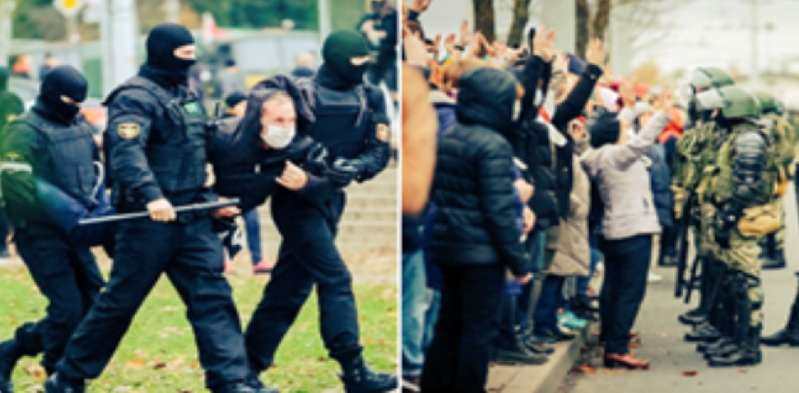Belarus: Savage attack and possible 3-year sentences against journalists reporting March against Terror

300 Belarusians were brutally detained on 1 November during a March against Terror, with 231 participants now facing criminal charges. A number of journalists were among those badly beaten and detained, with two Belsat correspondents reporting on the protests charged with ‘organizing riots’.
Belarusians have continued to come out in huge numbers in protest after Aleksandr Lukaszenko claimed to have won the presidential elections on August 9. Threats that live weapons will be used against demonstrators have doubtless deterred some, but huge numbers have still continued to come out in often creative and moving protest, from the original protests of women in white with flowers, to demonstrations by large crowds of pensioners or the disabled. The traditional Sunday demonstration on 1 November coincided with the annual March against Terror from the centre of Minsk to Kurapaty, a forested area outside Minsk where the mass graves lie of thousands of victims of NKVD Terror, executed between 1937 and 1941.
This was a march of remembrance, yet the enforcement officers who have demonstrated savagery, including among very young protesters and the elderly, blocked the columns of demonstrators from reaching the mass graves.
Belsat and other agencies report that many journalists were beaten, with three Belsat journalists detained. According to a teenager who was eventually released, the officers beat Belsat cameraman Dzmiter Sołtan around the head with his own video recorder. Two other journalists: Zmicier Krauczuk and Arciom Bahasłauski are also in custody. .Krauczuk was later fined for what was termed ‘taking part in an illegal gathering’ and released. The two other Belsat journalists: Soltan and Bahaslauski remain imprisoned, facing criminal charges under Article 342 of the Belarusian criminal code. They and an incredible 229 other Belarusians are charged with ‘organizing and planning group acts which seriously disturb public order’, and potentially face up to three years’ imprisonment.
Four journalists from the publication New Times were detained, with one of them, Dzmiter Dzmitrijeu badly beaten. He was able to inform his wife that police spokeswoman Wolha Czemodanawa had claimed that he did not deserve any special treatment because he’s a journalist. Belsat points out that even Belarusian law stipulates that journalists reporting on an event cannot also be deemed to have been participating in it.
The enforcement officers also used stun grenades and rubber bullets against the demonstrators. Thousands have been detained since the first savage crackdown on August 9, with horrific tales of torture. The regime has either forced opposition leaders into exile or imprisoned them.
The Belarusian people have demonstrated in mass numbers that they want Lukashenka to go, however with Russia’s support, and with over two decades of terror methods used against the opposition, Lukashenka is refusing to budge. The EU finally came up with some sanctions, but they do not appear to have targeted either Lukashenka or his son.
By themselves, however, Belarusians are demonstrating incredible persistence. Despite harassment from enforcement officers and violence from (almost certainly) state-hired thugs, senior Belarusians have continued to come out in protest. According to Minsk-based commentator, Franak Viačorka, “more and more people are taking to the streets”, with the demonstration by seniors on 1 November having outnumbers all those before.





